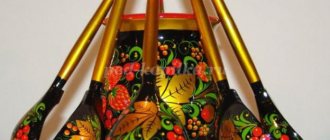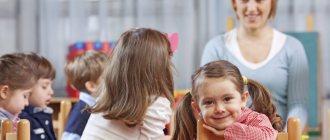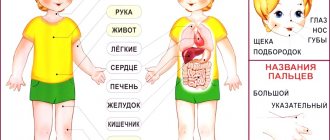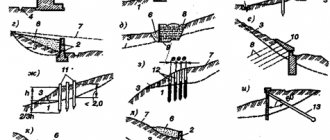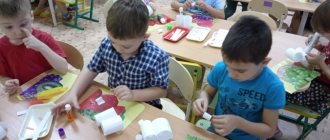GCD "Human Internal Organs"
Children:-
Yes (consider themselves or neighbors).
-But this is what we see, and there are many different organs inside our body. We don’t see them, but thanks to them, we live, breathe, think, eat. Guys, we can’t do without Professor Serdechkin and that’s why we will now go to visit him. Let's stand up, close our eyes and count to 5. Surprise moment: the professor's arrival. Hello guys, let us introduce you to the most important organs today...
Children:
- Let's.
Take a seat at the tables. Educator:-
Here is a diagram showing these organs. After getting to know each organ, you will color them in with markers and try to remember them.
Children:-
(look at the drawings)
Educator: -
Look at the image and find the head (children show the teacher what they found), well done.
What do you think is in it? Children: -
(give their guesses)
Educator: -
This is the brain.
It is one of the most important organs. Why do you think we need it? Children: -
To think (give their guesses)
— One of the most important organs is the brain. He is like the boss over all organs, he knows everything and is responsible for everything. The brain helps a person to be human. Think . Walk. Do different jobs.
One of the most important properties of our brain is memory. Our memory contains everything that a person learns during his life. And for memory to be good, it must be trained. Now, with the help of one exercise, we will train our memory.
Exercise: In front of the children are three-dimensional geometric shapes (cone, ball, pyramid, cube). Which? How many are there? (Children's answers).
You must remember the location of geometric shapes. Now close your eyes and see what has changed. Guys, when do you think our brain can rest? (children's answers)
— Our brain rests at night when we sleep darkly. Now let's find the brain in our drawing, take a brown pencil and color it.
Educator:-
Well done guys!
Now let's get acquainted with another important organ. Guess the riddle. Day and night it knocks, as if wound up. Children: -
(give their guesses)
Educator:-
Pay attention to
the heart
(the teacher points to the model with a pointer).
Place your palm on your chest. What do you feel. Children: -
Something is beating, this is the heart.
Educator:
The heart is located in the center of the chest, almost in the middle, and the size of a fist. Form your hand into a fist and place it in the center of your chest, slightly to the left. Make a fist with your hand. This is your heart. Do you and I have the same heart size? Why? The heart is like a big pump that pumps blood. Blood “runs” throughout the body through different vessels. The main task of blood is to feed the entire body. The heart works constantly, even when a person sleeps. Now clench and slightly unclench your fist - this is how the heart works: when it contracts, it pushes blood. What color is our blood? How did you find out about this? When blood flows from your wound, adults rush to treat the wound and stop the bleeding. This is very, very important because losing blood is very dangerous. How do you treat your wounds? The heart must be protected. But if a person decides to lie down all the time and do nothing to protect his heart, he will be very mistaken and will only harm his heart. The heart needs to be trained and exercise. When you run, your heart works faster. Place your palm on your heart, how does your heart beat? Quiet, calm. And now we will do a physical minute and compare whether something has changed or not
Speeches by participants of the Municipal Scientific and Practical Seminar
The media “Portal “World of Preschool Children” presents speeches by participants of the Municipal scientific and practical seminar “Early career guidance for preschool children within the framework of the Federal State Educational Standard”
GOAL : identifying and supporting talented, creatively working teachers of educational institutions of preschool education in the city of Stary Oskol, promoting their professional and personal development.
TASKS: • identifying and disseminating the innovative experience of educators and teachers in the city of Stary Oskol, Belgorod region, in creating a system of measures aimed at identifying the personal characteristics, interests and abilities of each person in order to assist him in making a reasonable choice of profession that best suits his individual capabilities of the Federal State Educational Standard.
SECTION No. 1 Joint activities of children and adults (teachers and parents) on early career guidance for preschoolers within the framework of the Federal State Educational Standard for Education.
| Introducing children to the world of professions Report Presentation | Methods of working with children to form ideas about the work of adults. Report | Formation of ideas about professions among older preschoolers Report Presentation |
| EFFECTIVE FORMS OF LABOR EDUCATION FOR PRESCHOOL CHILDREN THROUGH COOPERATION WITH PARENTS Report | CHILD IN THE WORLD OF PROFESSIONS Report | Consultation for parents “Family is the child’s first “career guidance”” Report |
| Using a developing subject-spatial environment to form preschoolers’ ideas about adult professions Report | Introducing children to the world of professions in preschool age. Report | Introducing preschool children to adult professions Report Presentation |
| Forms of work on early career guidance in the senior group of compensatory orientation Report Presentation | Early career guidance for preschool children Report | Formation of primary ideas about the work of adults through project activities in preschool educational institutions Report Presentation |
| Familiarization of preschool children with professions and work of adults Report | Interaction between kindergarten and family on early career guidance for preschoolers Report Audio presentation | Familiarizing children of senior preschool age with OHP with the professions of adults is one of the important tasks of a child’s socialization. Report |
| Using developmental aids as a means of early career guidance for preschool children Report | How we introduce children to professions Report Presentation | Formation of labor skills in preschool children through the organization of a subject-developmental environment Report |
| Forms of familiarization with the professions of pupils of senior preschool age Report | Forms and methods of working with preschool children to develop ideas about the work of adults Report | Introduction to the profession of an artist-designer Report |
| Formation of primary value ideas about professions in children | Early career guidance as an effective method of improving the quality of education of preschoolers in the context of the implementation of the Federal State Educational Standard Report | Introducing preschoolers with speech impairments to the world of professions through lexical and grammatical games and exercises. Report |
| Principles of early career guidance for preschool children Report | Formation of early career guidance in preschool children in the context of the implementation of the Federal State Educational Standard for Preschool Education Report | Early vocational guidance for preschoolers consultation for parents Report Audio presentation |
SECTION No. 2 Organization of independent activities of children in the process of becoming familiar with the professions of adults
| INTRODUCING PRESCHOOL CHILDREN TO ADULT PROFESSIONS THROUGH GAMES Report Presentation | Methodological development “We are metallurgists” Report Presentation | Organization of independent activities of children in the process of familiarization with the professions of adults using the example of the profession of a teacher . Report Presentation |
| FAMILIARIZING OLDER CHILDREN WITH THE PROFESSIONS OF ADULTS AS A WAY OF FORMING POSITIVE ATTITUDES TO WORK Report | Methodological development of the role-playing game “I am a builder” for children 6-7 years old Report Presentation | Introducing children to professions through role-playing games. Report |
| Formation of ideas about people of different professions among children in a preschool educational institution Report | Early career guidance for preschoolers with disabilities Report Presentation | Formation of primary ideas about the work of adults in preschool age Report |
| USING ALGORITHMS IN THE PROCESS OF FAMILIARIZING CHILDREN 5-6 YEARS OLD WITH DIFFERENT PROFESSIONS Report Presentation | FORMATION OF INTEREST IN PRESCHOOL CHILDREN IN PEOPLE OF DIFFERENT PROFESSIONS Report Presentation Audio speech | Organization of independent activities of children in the process of becoming familiar with the professions of adults Report Presentation |
| Formation of early career guidance in older preschoolers through role-playing games. Report | “Career guidance for preschoolers in the context of play activities” Report Presentation | All works are good - choose according to your taste! Report Presentation Audio speech |
| Role-playing games for children of senior preschool age Report Presentation | Project for conducting a role-playing game “Fashion House” in a preparatory school group Report Presentation | “Organization of independent activities of children in the process of familiarization with the professions of adults” Report |
| Introducing children to the profession through play activities Report Presentation | All professions are important, all professions are needed Report Presentation | ALL PROFESSIONS ARE IMPORTANT NOD Report Presentation |
| The use of educational games for children with autism spectrum disorders in the process of becoming familiar with adult professions. Report Presentation | Today is a game, tomorrow is a profession Report Photo report | Role-playing game “Barbershop” for preschool children Report |
Advertising message
SECTION No. 3 Comprehensive work of preschool educational institutions specialists to develop knowledge about professions among preschoolers
| Formation of ideas about professions among children of senior preschool age Report Presentation | Early career guidance for preschool children within the framework of the Federal State Educational Standard Report | JOURNEY OF KOLOBOK technological map of the lesson Report Presentation |
| FORMS OF WORK WITH PRESCHOOL CHILDREN IN EARLY CAREER GUIDANCE Report Presentation | Interaction between a teacher and a speech therapist as part of early career guidance for preschoolers with severe speech impairments Report | Formation of ideas about the world of work and professions in preschool children Report Presentation |
| Role-playing game as a method of organizing early career guidance for preschool children in preschool educational institutions Report Presentation | Organization of work in preschool educational institutions on early career guidance for preschoolers Report Photo report | “City of Masters” is a speech therapy class in a compensatory preparatory school group for children with severe speech impairments. Report |
| USING GAME TECHNOLOGIES AS A MEANS OF FORMING AND EXPANDING PRESCHOOL CHILDREN'S KNOWLEDGE ABOUT THE WORLD OF PROFESSIONS Report Presentation | Lesson summary for the senior group “All professions are important, all professions are needed!” Report | “Ways and techniques for introducing senior preschoolers to the profession of a theater actor in the process of OOD in music education” Report |
| “Modern methods in the work of a teacher when introducing preschoolers to a variety of professions in accordance with the Federal State Educational Standard for Education” Report | Introducing preschoolers and schoolchildren to the professional activities of adults Report | “Current forms and methods in music education that promote early career guidance for preschool children” Report |
| Career guidance work with children with ASD Report | Objectives of career guidance work of teachers with preschool children with disabilities, review of early career guidance programs | Role-playing games in the life of a modern preschooler as a means of developing early career guidance. Report |
| “Introduction to professions” Report Presentation |
The FULL table of seminar participants is HERE
Drawing a person in kindergarten Teacher-methodologist Elena Egorovna Zaitseva. - presentation
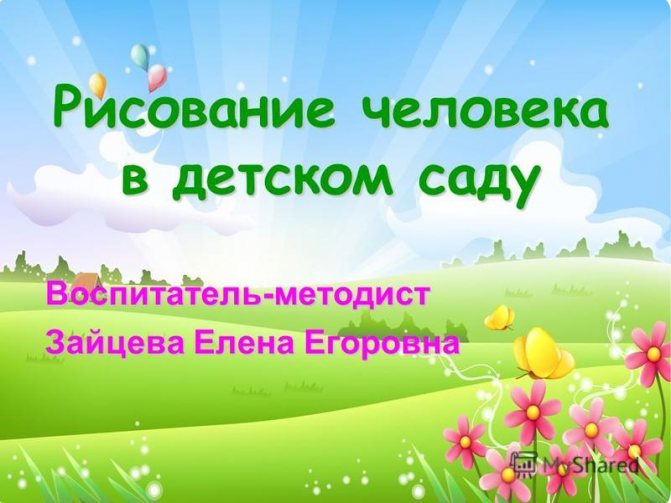
Drawing a person in kindergarten Teacher-methodologist Elena Egorovna Zaitseva
2nd junior group Themes of images: doll, snowman, tumbler.
2nd junior group In drawing, first depict a large circle - the body, and then a smaller circle - the head. The image is supplemented with lines (hands), dots (face).
2nd junior group If desired, you can draw expressive details (buttons, pockets, etc.).
Middle group Familiarity with the triangular shape in this group makes adjustments to the way a person is depicted.
Middle group. Stages of drawing 1. Examine the doll in a long sundress and, with an outlining gesture, highlight the triangular shape of the sundress, paying special attention to the width of its lower part.
Middle group. Stages of drawing 2. Draw a horizontal line at the bottom of the sheet, commenting on your actions with the words: “What a wide sundress!”
Middle group. Drawing steps 3. Place a dot in the middle of the top of the sheet. 4. From this point, draw inclined lines to the ends of the horizontal line.
Middle group. Drawing Steps 5. Then draw a circle (head) on the top of the equilateral triangle.
Middle group. Stages of drawing 6. To the left and right of the vertex of the triangle we draw rectangles, orienting children to the fact that their length is equal to half the height of the triangle (sundress).
Middle group. Stages of drawing 7. The image is supplemented with details (facial features, hair, palms, collar, etc.) 8. Children may not depict legs.
Senior group At this age, when depicting a person, a child must learn to show the following in a drawing: 1. The proportions of the figure (the ratio of the head, torso, arms and legs). 2. The structure of the figure (head, neck, shoulders, torso, legs, etc.). 3. Movement of arms, legs, head. 4. Convey the comparative height of the figure of an adult and a child.
Senior group. Stages of drawing: Children draw in clothes. Therefore, before you start drawing, you need to consider the shape of the shirt, shorts, dress, etc.
Senior group. Stages of drawing Drawing begins with the shape of the body, i.e. from a shirt or blouse, shorts or skirt. We mark the middle of the body, since this line (waist line) becomes a guideline when drawing arms in motion.
Senior group. Stages of drawing Next, draw an oval of the head, neck, arms, legs, etc. The length of the arms and legs (approximately) is equal to the length of the combined height measurements of the shirt and shorts (or blouse and skirt).
Senior group. Stages of drawing The size of the head depends on whether the picture is an adult or a child. The size of an adult's head fits 7-8 times the height of the entire figure. In a child, this size ranges from 4 to 5 times.
Senior group. Stages of drawing In the drawing of the head, facial features, ears and hair should be clearly visible. All movements of the human figure are performed from the front.
Man image option 2
Man image option 3
Preparatory group In the preparatory group, children depict a human figure in profile. This method is more complicated, but the drawing is more expressive. A profile image conveys movement better.
Thank you for your attention and good luck in your work!

